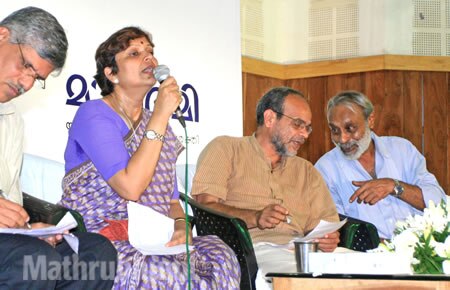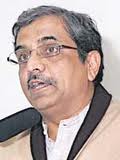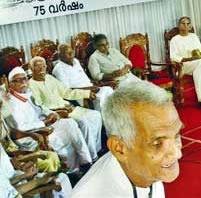Gandhiji underlined need for sustainability
Posted on: 16 Aug 2010
Good morning ladies and gentlemen, I am honoured to deliver this keynote address and am grateful to Mathrubhumi organisers for inviting me here especially to share my views on conservation and how conservation today could be linked to the Gandhian thoughts on sustainability. I am aware that I am neither a scholar, nor an authority on Mahatmaji or his visionary work. I am a Conservation Practitioner, trying to achieve conservation of valuable natural resources including forests, biodiversity, water and centuries' old cultures that have helped us to understand nature. Probably this little work has brought me here.
Similarly to discuss about conservation in the beautiful settings of Wayanad in the Western Ghats is another opportunity. I have been making efforts to save the valuable resources in parts of the Western Ghats in northern Maharashtra, through action on the ground, involving communities and through iterating the values among the people and stakeholders from the region. For more than two decades since the historical Save the Western Ghats March of 1987-88, we have been trying to bring together people from all walks of life to understand the importance of these mountains for our own survival. In the times of frustration, with maddening impacts of globalisation on biodiversity and people, Gandhian thoughts on sustainability help to persist on the cause of conservation.
Gandhiji was ahead of his times in thinking as well as in actions at least by half a century, otherwise we would not have realised his thoughts came true scientifically. Extreme greed without any limits is killing human societies slowly but steadily i.e. over-exploitation of natural resources. I think the discussion on Gandhiji's vision of conservation has to start with his very famous quote 'The world has enough for everyone's need, but not enough for anyone's greed'; however this quote has been overused and seldom understood in its real meaning.
In 1928, Mahatma Gandhi observed, 'God forbid that India should ever take to industrialisation after the manner of the West. He further added that the economic imperialism of a single tiny island kingdom (the UK) is today keeping the world in chains. If an entire nation of 300 million took to similar economic exploitation, it would strip the world bare like locusts.' More than half a century before anyone had
even considered the term 'Sustainable Development', Mahatma Gandhi warned of the dangers facing a rapidly developing world. Almost 80 years later, the population of India is four times than it was in 1930s, and the US - the world's greatest over-consumer - has a population of 300 million.
The risks prophesised by Gandhi have started to come true.
Today the extreme consumerist model has destroyed nature as well as humans. The nature is taking its toll and happenings like cloudbursts in Leh, Ladakh or floods in Pakistan or heat waves in Europe or deaths by smoke in Russia; are all results of extreme consumerism. The statement might sound bold and emotional to some of you, but its true as we all have understood (though some of us may not agree) that
human actions within last couple of centuries are responsible for climate change. The human arrogance in that we own the Earth has impacted the planet in adverse manner to the level, that the nature has lost its self-healing capacity. It no more can correct faults of human actions.
The greed however is not limited to individual voracity but groups, villages, towns and countries, are all victims. Since the history of last couple of thousand years of development of human beings, we have overused and destroyed without thinking or caring for nature. We cleared forests, we damned the rivers, we polluted the air, we mined the ores at the cost of biodiversity, killed the animals, destroyed their
habitats ...the list is ever increasing because humans were always trying to control nature. Some societies like indigenous people have tried to maintain the balance, but of late they are being developed and modernised, again in the process causing more damage to the nature. The rate of such destruction was limited till the industrial revolution of late eighteenth century. Industrial revolution initiated in Europe has
spread across the world and machines and technology started replacing the human work force. I do not want to go into the details of how this revolution has affected as well as helped the progress colonial European nations. But the point here is, this process has sown the seeds of today's horrifying state of environmental affairs and ravenousness among the most dominant species on the earth; that is us.
In the process of growth, progress and more controls, the economists and policy makers at global as well as regional level have forgotten about the natural wealth as safe deposit for future. I think because we had all forgotten Mahatma and his message of sustainability. We have forgotten the purpose of existence of all other creatures, however small or big they are and our responsibility towards harmony. There is a need to establish balance between what we want, what we really need and what we must not use. There has to be a balance between development and conservation. Probably Gandhiji was the only leader, philosopher and thinker who underlined the need for building a truly sustainable society and simple ways of maintaining this balance. Unfortunately most of us have forgotten his real message and instead are happy to just consider him as only a great leader who fought for the independence of the country. We have pushed him to the brink of nailing him up on the high walls of bureaucratic buildings without ever pondering over what he dreamt for us, for our society and our times.
What we can learn for conservation from Gandhiji is not a difficult proposition. But before seeking answer to that, we need to understand the deep impacts of the new colonisation i.e. globalisation. The process of globalisation and competition that is at the core of it, is causing more and more consumerism. There is an increasingly ugly bombarding of more and more cell phones, televisions, cars or their consumer goods being churned out by multinationals, since they want profits and more profits. The consumers are being fed onto the new value system of neo-colonialism, blinded by the glaring shimmers of the market and on the other hand, the acute apathy of malevolent government systems. This entire system results in cut-throat competition and ever soaring greed to accumulate more and more among individuals, corporations and societies.
This entire value system change and acculturation also reflects the inbuilt crises of our modern education system which has no space for our culture and no space for bringing together the best of both ancient and modern cultures. The indigenous societies till last couple decades, both here and abroad, were using resources sustainably, because their cultures provided space for respect to nature and
other living beings. It was the need and content that drove the societies, where as globalisation forces only exploitation and consumption. The indigenous people of India had great traditions like maintaining forest patches in the name of spirits and deities as sacred groves, not only forests but mountain and rivers were also sacred. Globalisation does not believe in supremacy of anything else but humans and their
technology. Since it understands only consumers, there have been systematic efforts to kill the customary laws of such indigenous societies by the forces of globalisation. There have been efforts of mainstreaming them, rather than offering the benefits of
development to them without destroying their identities.
Coming back to the markets and how they force us to destroy the nature, in many cases indirectly without the knowledge of the consumer, I would like to continue the case of cell phones that Dr. Michael Warren talked about in his speech in February, 2010. The cell phone production and its use by huge number of consumers made India the number one user of the gadget. It is claimed, and also true to a certain
extent that it helped in empowering the poor people, and rural women of the society, but at the same time use of cell phones forces them to use part of their meagre income for it. Why they would pay the cost of empowerment, which is going from their paltry incomes through daily wages, straight to the corporations involved in manufacturing cell phones and the service providers? This is the social debate
on the use of cell phones, but how many of us know that cell phones have direct impacts on environment and conservation of valuable biodiversity? In all the cell phones, a metal called Coltan is used that forms an integral part of the technology. This metal is found only in the Congo basin in Africa , which is the last refuge of the lowland Gorilla. More demand for cell phone requires more mining of the metal
from the region and more mining is destroying more and more of the last remaining habitats of these magnificent creatures. Mostly people need charismatic species to understand the need of conservation and these gorillas are one such species. But still how many of us will stop changing cell phones often and how the multinationals will not force us to change the gadget using technology, like television and other
forms of media?
The technology and great heights human beings have achieved in the process of development due to technology are considered the answer to everything; however, for most of the technologies, unfortunately the ultimate cost we pay is that of nature. Mining and hydropower are much talked about in the debate of conservation. Why we need more cars that will pollute more and add more to green house gases?
Why we need more power for our polluting industries at the cost of forests being submerged under the dams? The more cars and more industries need more metals that will promote more mining and more corporate benefits at the costs of daily life requirements of poor and at the cost of biodiversity. All this is the impact of globalisation, which on one hand claims to bring development and benefits to poor
and on the other hand grabs all the benefits back to their own systems for more exploitation of both the nature and the poor.
The answer Gandhiji provided us was very simple as I have mentioned earlier. He asked the youth to go back to the villages, to serve the rural India. However we all have forgotten that! Our cities, the urban areas are best examples of divide between rich and poor and globalisation is increasing the gap. Gap between rich and poor is so in rural areas too, maintained by feudalism that stands on caste system and landlessness. However in the cities it is clearly processes of globalisation and decreasing resources that are widening the gap. Industries on the other hand, are, penetrating into the remote areas not for providing employment, but due to the low investments in land and establishment as well as cheap migratory labour force are available everywhere in India. Why people migrate? Instinct is one easy answer but due to many development projects we have been creating environmental refugees. The unsustainable use of resources has destroyed the resource base in the rural area. Forests are cut, water is not available or polluted, and the possibilities of livelihoods keep on decreasing. The work available through upcoming industry is for the skilled workers and not to uneducated farmers. People have to migrate because good education is not available in the rural areas. Again the new expensive education system is spreading into the remote areas, without space for local poor
childre. All these result in rural masses migrating to urban areas, in the processes putting more and more pressure on the resources like water and land. Therefore it is the failure of policies to develop the rural areas using the principle of sustainability following the advice of Mahatma that agrarian countries like India have a better future to develop rural areas as sustainable units of development and sincere upliftment of
all the sections of society.
With no or little opportunities existing in rural India, people from these areas are chasing the model of urbanisation blindly in a hope to find their share too, in the so-called fruits of development. The economic backbone of the country, agriculture is being slowly and systematically destroyed each day by the forces of neo-liberalism and neo-colonialism. The greed of corporates and their feudal agents has played
havoc with land use changes. Millions of acres of rich fertile agricultural land have been fed to the real estate lobbies to make luxury livings for the rich. Agro-based industries like sugar industry are being promoted at the cost of natural resources like water. Land degradation is becoming rampant due to over use of fertilisers. Mining for the profits of richest corporations have left the earth bleeding. It's time to
stop this chase leading to self-destruction and learn from what Gandhi had thought about these catastrophes. Gandhiji wanted every village in independent India a self sufficient sustainable production unit, serving people's need and maintaining the fragile limited natural resources. Today we are doing our best to destroy local natural resources, be it water, forests, soils, or the land itself.
Therefore, it is obvious that we need to think about our development model again. I am sure we can go back in times and reverse the processes, but change has to be on many levels. All the technology is not bad per se, we certainly need many of them but informed choice matters. Through the history of human development, we have now reached such a stage that we need to draw a line. These decisions
will have to be considered at the global level. We should promote solar energy, wind energy as well as other forms of sustainable energy, giving a little rest to forests and ecosystems to rejuvenate, for our water to recycle and refill. Again the state or governments may not be in a position to do everything. We as consumers must demand it because in a globalised world only the demands of consumers are
met. We must believe in Gandhiji's thoughts that everyone can make difference, if we perform right actions at right time; we will achieve the change for better.
Again we all like to talk, discuss, debate both Conservation and Gandhiji. But the need today is to act. We at my organisation, as well as Save the Western Ghats group are trying to rebuild what we have lost, but not lost completely yet. And Gandhiji's wisdom always provides courage and confidence to do so.
What is the need of the hour? We need to have Bapu once again to bless us and guide us? But that was not his idea. He wanted all of us to seriously follow his thoughts, modify them using our innovations and work for the greater India where there will be sustainability and equality. Each one of us should act like Gandhiji , follow him not only in thoughts but also in actions. We all must try to become his
real followers by consuming less, adapting to simplicity and to inculcate the habit of sharing to avoid the overexploitation of any resources, to maintain our fragile ecosystems and forests, after all we all need to keep something for our next generations.
Dr. Archana Godbole is Founder-President of Applied Environmental Research Foundation, Pune.

|
| (From left) Prof. E. Kunhikrishnan, Dr. Archana Godbole, Pandurang Hegde, M.J.Vijaya Padman (Director, Mathrubhumi) |
Similarly to discuss about conservation in the beautiful settings of Wayanad in the Western Ghats is another opportunity. I have been making efforts to save the valuable resources in parts of the Western Ghats in northern Maharashtra, through action on the ground, involving communities and through iterating the values among the people and stakeholders from the region. For more than two decades since the historical Save the Western Ghats March of 1987-88, we have been trying to bring together people from all walks of life to understand the importance of these mountains for our own survival. In the times of frustration, with maddening impacts of globalisation on biodiversity and people, Gandhian thoughts on sustainability help to persist on the cause of conservation.
Gandhiji was ahead of his times in thinking as well as in actions at least by half a century, otherwise we would not have realised his thoughts came true scientifically. Extreme greed without any limits is killing human societies slowly but steadily i.e. over-exploitation of natural resources. I think the discussion on Gandhiji's vision of conservation has to start with his very famous quote 'The world has enough for everyone's need, but not enough for anyone's greed'; however this quote has been overused and seldom understood in its real meaning.
In 1928, Mahatma Gandhi observed, 'God forbid that India should ever take to industrialisation after the manner of the West. He further added that the economic imperialism of a single tiny island kingdom (the UK) is today keeping the world in chains. If an entire nation of 300 million took to similar economic exploitation, it would strip the world bare like locusts.' More than half a century before anyone had
even considered the term 'Sustainable Development', Mahatma Gandhi warned of the dangers facing a rapidly developing world. Almost 80 years later, the population of India is four times than it was in 1930s, and the US - the world's greatest over-consumer - has a population of 300 million.
The risks prophesised by Gandhi have started to come true.
Today the extreme consumerist model has destroyed nature as well as humans. The nature is taking its toll and happenings like cloudbursts in Leh, Ladakh or floods in Pakistan or heat waves in Europe or deaths by smoke in Russia; are all results of extreme consumerism. The statement might sound bold and emotional to some of you, but its true as we all have understood (though some of us may not agree) that
human actions within last couple of centuries are responsible for climate change. The human arrogance in that we own the Earth has impacted the planet in adverse manner to the level, that the nature has lost its self-healing capacity. It no more can correct faults of human actions.
The greed however is not limited to individual voracity but groups, villages, towns and countries, are all victims. Since the history of last couple of thousand years of development of human beings, we have overused and destroyed without thinking or caring for nature. We cleared forests, we damned the rivers, we polluted the air, we mined the ores at the cost of biodiversity, killed the animals, destroyed their
habitats ...the list is ever increasing because humans were always trying to control nature. Some societies like indigenous people have tried to maintain the balance, but of late they are being developed and modernised, again in the process causing more damage to the nature. The rate of such destruction was limited till the industrial revolution of late eighteenth century. Industrial revolution initiated in Europe has
spread across the world and machines and technology started replacing the human work force. I do not want to go into the details of how this revolution has affected as well as helped the progress colonial European nations. But the point here is, this process has sown the seeds of today's horrifying state of environmental affairs and ravenousness among the most dominant species on the earth; that is us.
In the process of growth, progress and more controls, the economists and policy makers at global as well as regional level have forgotten about the natural wealth as safe deposit for future. I think because we had all forgotten Mahatma and his message of sustainability. We have forgotten the purpose of existence of all other creatures, however small or big they are and our responsibility towards harmony. There is a need to establish balance between what we want, what we really need and what we must not use. There has to be a balance between development and conservation. Probably Gandhiji was the only leader, philosopher and thinker who underlined the need for building a truly sustainable society and simple ways of maintaining this balance. Unfortunately most of us have forgotten his real message and instead are happy to just consider him as only a great leader who fought for the independence of the country. We have pushed him to the brink of nailing him up on the high walls of bureaucratic buildings without ever pondering over what he dreamt for us, for our society and our times.
What we can learn for conservation from Gandhiji is not a difficult proposition. But before seeking answer to that, we need to understand the deep impacts of the new colonisation i.e. globalisation. The process of globalisation and competition that is at the core of it, is causing more and more consumerism. There is an increasingly ugly bombarding of more and more cell phones, televisions, cars or their consumer goods being churned out by multinationals, since they want profits and more profits. The consumers are being fed onto the new value system of neo-colonialism, blinded by the glaring shimmers of the market and on the other hand, the acute apathy of malevolent government systems. This entire system results in cut-throat competition and ever soaring greed to accumulate more and more among individuals, corporations and societies.
This entire value system change and acculturation also reflects the inbuilt crises of our modern education system which has no space for our culture and no space for bringing together the best of both ancient and modern cultures. The indigenous societies till last couple decades, both here and abroad, were using resources sustainably, because their cultures provided space for respect to nature and
other living beings. It was the need and content that drove the societies, where as globalisation forces only exploitation and consumption. The indigenous people of India had great traditions like maintaining forest patches in the name of spirits and deities as sacred groves, not only forests but mountain and rivers were also sacred. Globalisation does not believe in supremacy of anything else but humans and their
technology. Since it understands only consumers, there have been systematic efforts to kill the customary laws of such indigenous societies by the forces of globalisation. There have been efforts of mainstreaming them, rather than offering the benefits of
development to them without destroying their identities.
Coming back to the markets and how they force us to destroy the nature, in many cases indirectly without the knowledge of the consumer, I would like to continue the case of cell phones that Dr. Michael Warren talked about in his speech in February, 2010. The cell phone production and its use by huge number of consumers made India the number one user of the gadget. It is claimed, and also true to a certain
extent that it helped in empowering the poor people, and rural women of the society, but at the same time use of cell phones forces them to use part of their meagre income for it. Why they would pay the cost of empowerment, which is going from their paltry incomes through daily wages, straight to the corporations involved in manufacturing cell phones and the service providers? This is the social debate
on the use of cell phones, but how many of us know that cell phones have direct impacts on environment and conservation of valuable biodiversity? In all the cell phones, a metal called Coltan is used that forms an integral part of the technology. This metal is found only in the Congo basin in Africa , which is the last refuge of the lowland Gorilla. More demand for cell phone requires more mining of the metal
from the region and more mining is destroying more and more of the last remaining habitats of these magnificent creatures. Mostly people need charismatic species to understand the need of conservation and these gorillas are one such species. But still how many of us will stop changing cell phones often and how the multinationals will not force us to change the gadget using technology, like television and other
forms of media?
The technology and great heights human beings have achieved in the process of development due to technology are considered the answer to everything; however, for most of the technologies, unfortunately the ultimate cost we pay is that of nature. Mining and hydropower are much talked about in the debate of conservation. Why we need more cars that will pollute more and add more to green house gases?
Why we need more power for our polluting industries at the cost of forests being submerged under the dams? The more cars and more industries need more metals that will promote more mining and more corporate benefits at the costs of daily life requirements of poor and at the cost of biodiversity. All this is the impact of globalisation, which on one hand claims to bring development and benefits to poor
and on the other hand grabs all the benefits back to their own systems for more exploitation of both the nature and the poor.
The answer Gandhiji provided us was very simple as I have mentioned earlier. He asked the youth to go back to the villages, to serve the rural India. However we all have forgotten that! Our cities, the urban areas are best examples of divide between rich and poor and globalisation is increasing the gap. Gap between rich and poor is so in rural areas too, maintained by feudalism that stands on caste system and landlessness. However in the cities it is clearly processes of globalisation and decreasing resources that are widening the gap. Industries on the other hand, are, penetrating into the remote areas not for providing employment, but due to the low investments in land and establishment as well as cheap migratory labour force are available everywhere in India. Why people migrate? Instinct is one easy answer but due to many development projects we have been creating environmental refugees. The unsustainable use of resources has destroyed the resource base in the rural area. Forests are cut, water is not available or polluted, and the possibilities of livelihoods keep on decreasing. The work available through upcoming industry is for the skilled workers and not to uneducated farmers. People have to migrate because good education is not available in the rural areas. Again the new expensive education system is spreading into the remote areas, without space for local poor
childre. All these result in rural masses migrating to urban areas, in the processes putting more and more pressure on the resources like water and land. Therefore it is the failure of policies to develop the rural areas using the principle of sustainability following the advice of Mahatma that agrarian countries like India have a better future to develop rural areas as sustainable units of development and sincere upliftment of
all the sections of society.
With no or little opportunities existing in rural India, people from these areas are chasing the model of urbanisation blindly in a hope to find their share too, in the so-called fruits of development. The economic backbone of the country, agriculture is being slowly and systematically destroyed each day by the forces of neo-liberalism and neo-colonialism. The greed of corporates and their feudal agents has played
havoc with land use changes. Millions of acres of rich fertile agricultural land have been fed to the real estate lobbies to make luxury livings for the rich. Agro-based industries like sugar industry are being promoted at the cost of natural resources like water. Land degradation is becoming rampant due to over use of fertilisers. Mining for the profits of richest corporations have left the earth bleeding. It's time to
stop this chase leading to self-destruction and learn from what Gandhi had thought about these catastrophes. Gandhiji wanted every village in independent India a self sufficient sustainable production unit, serving people's need and maintaining the fragile limited natural resources. Today we are doing our best to destroy local natural resources, be it water, forests, soils, or the land itself.
Therefore, it is obvious that we need to think about our development model again. I am sure we can go back in times and reverse the processes, but change has to be on many levels. All the technology is not bad per se, we certainly need many of them but informed choice matters. Through the history of human development, we have now reached such a stage that we need to draw a line. These decisions
will have to be considered at the global level. We should promote solar energy, wind energy as well as other forms of sustainable energy, giving a little rest to forests and ecosystems to rejuvenate, for our water to recycle and refill. Again the state or governments may not be in a position to do everything. We as consumers must demand it because in a globalised world only the demands of consumers are
met. We must believe in Gandhiji's thoughts that everyone can make difference, if we perform right actions at right time; we will achieve the change for better.
Again we all like to talk, discuss, debate both Conservation and Gandhiji. But the need today is to act. We at my organisation, as well as Save the Western Ghats group are trying to rebuild what we have lost, but not lost completely yet. And Gandhiji's wisdom always provides courage and confidence to do so.
What is the need of the hour? We need to have Bapu once again to bless us and guide us? But that was not his idea. He wanted all of us to seriously follow his thoughts, modify them using our innovations and work for the greater India where there will be sustainability and equality. Each one of us should act like Gandhiji , follow him not only in thoughts but also in actions. We all must try to become his
real followers by consuming less, adapting to simplicity and to inculcate the habit of sharing to avoid the overexploitation of any resources, to maintain our fragile ecosystems and forests, after all we all need to keep something for our next generations.
Dr. Archana Godbole is Founder-President of Applied Environmental Research Foundation, Pune.



















